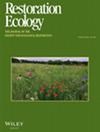森林转型:恢复在澳大利亚本土林业转型中的作用
IF 2.7
3区 环境科学与生态学
Q2 ECOLOGY
引用次数: 0
摘要
澳大利亚大部分地区正在重新考虑或积极淘汰本土林业。这种转型在世界其他地方也曾发生过,但在澳大利亚,政府并没有从生态或法律角度明确说明这些林区将变成什么样。在这项研究中,我们调查了从本地林业转型的生态、气候和管理背景,并将我们的研究结果与全球生物多样性框架推动恢复地球 30% 的陆地、海岸和海洋相结合。我们展示了政府在规划前原生林区未来时存在的重要差距,认为 "林业之后",这些地方中的许多都需要积极干预,以恢复这些生态系统并解决历史性的土地退化问题。本案例研究将法律分析与恢复文献综述相结合,以说明恢复科学发展所处的治理框架的重要性。我们展示了随着气候变化在大范围内进行恢复治理的复杂性,以及调和分散的治理安排的潜在机会,以确保这一过渡能在目前退化的地区形成具有恢复力的森林生态系统。本文章由计算机程序翻译,如有差异,请以英文原文为准。
Transformation in the forest: the role for restoration in the transition away from native forestry in Australia
The native forestry industry is being reconsidered, or actively phased out, across most parts of Australia. This kind of transition has happened elsewhere in the world but, in Australia, there is no clarity from governments about what those forestry areas will become, from an ecological or legal perspective. In this research, we investigate the ecological, climatic, and governance contexts for this transition away from native forestry, placing our results in the context of the Global Biodiversity Framework's push to restore 30% of the Earth's land, coasts and oceans. We demonstrate important gaps in government planning for the future of former native forestry coupes, arguing that “after forestry” many of these places will need active intervention to recover these ecosystems and address historic land degradation. This case study combines legal analysis with a review of the restoration literature to illustrate the importance of the governance framework within which restoration science is evolving. We demonstrate the complexity of governing restoration at large scales as the climate changes, as well as potential opportunities to reconcile fragmented governance arrangements, to ensure that this transition results in resilient forest ecosystems in currently degraded areas.
求助全文
通过发布文献求助,成功后即可免费获取论文全文。
去求助
来源期刊

Restoration Ecology
环境科学-生态学
CiteScore
6.50
自引率
15.60%
发文量
226
审稿时长
12-24 weeks
期刊介绍:
Restoration Ecology fosters the exchange of ideas among the many disciplines involved with ecological restoration. Addressing global concerns and communicating them to the international research community and restoration practitioners, the journal is at the forefront of a vital new direction in science, ecology, and policy. Original papers describe experimental, observational, and theoretical studies on terrestrial, marine, and freshwater systems, and are considered without taxonomic bias. Contributions span the natural sciences, including ecological and biological aspects, as well as the restoration of soil, air and water when set in an ecological context; and the social sciences, including cultural, philosophical, political, educational, economic and historical aspects. Edited by a distinguished panel, the journal continues to be a major conduit for researchers to publish their findings in the fight to not only halt ecological damage, but also to ultimately reverse it.
 求助内容:
求助内容: 应助结果提醒方式:
应助结果提醒方式:


